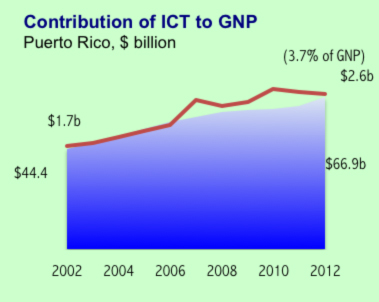Puerto Rico needs to focus on information tech sector

 At a time of slow growth and continued volatility, many countries are looking for policies that will stimulate growth and create new jobs. Information communications technology (ICT) is not only one of the fastest growing industries — directly creating millions of jobs — but it is also an important enabler of innovation and development.
At a time of slow growth and continued volatility, many countries are looking for policies that will stimulate growth and create new jobs. Information communications technology (ICT) is not only one of the fastest growing industries — directly creating millions of jobs — but it is also an important enabler of innovation and development.
So, it’s not far-fetched to say that Puerto Rico should jump on that international bandwagon by creating focused strategies to make the most of what that economic sector has to offer.
In fact, developing a robust ICT sector was at the heart of a proposal unveiled about 10 years ago, when economist firm H. Calero Consulting Group, in cooperation with AT Kearney and other local organizations developed the “Vision and Stakeholder Plan for Puerto Rico 2025” plan, which proposed steps to take toward a knowledge-based economy.
As stated in the report: “In 2025, Puerto Rico is a prosperous, productive, and innovative society, capable of generating knowledge with an entrepreneurial spirit and supported by an efficient public sector… Knowledge and technology are the main drivers of the economy.”
The strategies required to achieve this vision focussed on improving Puerto Rico ICT infrastructure and human capital.
Among the strategies were: improving the competitiveness, quality, and capacity of Puerto Rico’s telecom and IT infrastructure by identifying relative infrastructure gaps and weaknesses, benchmark ICT infrastructure initiatives in best practice countries, continue to address regulatory, capital, and other barriers, to stimulate private sector provision, modify regulations to include ICT requirements in all new projects, and offer targeted incentives.
The plan called for increased productivity of local human capital through increasing use of technology; adopt programs to overcome technology gaps in IT and thereby, enable government information and processes. Other recommended initiatives call for technology usage and training for business and professional associations as well as expansion of computer and Internet training and certification programs.
“Partnerships with IT vendors can assist in completing the IT infrastructure and training throughout the educational system. Training and skills programs will raise labor productivity. Reducing regulatory inefficiencies will positively impact the economy,” said H. Calero Consulting in its latest in-house report, “Economic Pulse.”
“An effective IT strategy will overhaul the positioning and branding of Puerto Rico; promote investment and exports, including advanced manufacturing R&D. Other recommended short-term strategies of PR 2025 include streamlining approval processes to match best-practice competitors,” the company said.
A roadmap is available
In the last year, the current administration has retained the services of Boston Consulting Group to overhaul Puerto Rico’s economic strategy. The so-called “Economic Roadmap 2013-2018,” spearheaded by the Puerto Rico Industrial Development Company, banks on: knowledge as a priority sector and on protecting the island’s existing industrial base; enable business expansion through clusters; attract new companies; and identify emergent segments that match Puerto Rico’s capabilities.
“The vision of establishing Puerto Rico as a global center for the knowledge services industry includes initiatives to establish Puerto Rico as a worldwide knowledge process outsourcing hub; seek integrated outsourcers; expand information technology and business process outsourcing sectors, and expand aerospace and defense industries. What will this take?,” the report questions.
At present, Puerto Rico is lagging behind its major international competitors in several ways. When it comes to Internet connectivity, the island has 51 Internet users per 100 people, vs. Denmark, which has 93 Internet users per 100 people, and Ireland and Singapore had 79 and 74, respectively.
 The situation is similar in broadband penetration. In 2012, there were only 51 broadband users per 100 people in Puerto Rico while some of the island’s direct competitors, like Singapore and Denmark, had 26 and 38 broadband users per 100 people. Studies show that a 10 percent increase in broadband penetration is associated with a 1.4 percent increase in Gross Domestic Product growth in low-middle income countries and a 1.2 percent growth in high-income countries.
The situation is similar in broadband penetration. In 2012, there were only 51 broadband users per 100 people in Puerto Rico while some of the island’s direct competitors, like Singapore and Denmark, had 26 and 38 broadband users per 100 people. Studies show that a 10 percent increase in broadband penetration is associated with a 1.4 percent increase in Gross Domestic Product growth in low-middle income countries and a 1.2 percent growth in high-income countries.
“The unprecedented explosion of connected devices throughout the world has created new ways for businesses to serve their customers. Numerous public services have become available online and through mobile phones,” the economist firm said.
“The transition to cloud computing is one of the key trends for modernization. ICT has enabled the emergence of a completely new sector: the app industry. Research shows that Facebook apps alone created over 182,000 jobs in 2011, and that the aggregate value of the Facebook app economy exceeds $12 billion. Puerto Rico needs to and should focus on this strategic economic sector,” the firm concluded.














